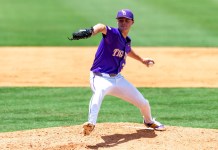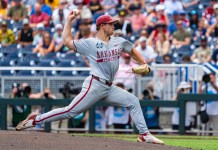Regardless of your favorite sport to bet on, once March hits, groupthink tends to take over.
For the next few weeks, almost all of the betting attention and chatter will be directed toward college basketball. And it won’t just come from those who comfortably move through a sportsbook or can swipe around a betting app with their eyes closed.
March Madness is the time when people who don’t consider themselves gamblers all of a sudden have a vested interest in the games.
It all starts on Selection Sunday after brackets are sent out, maybe by a co-worker, or a travel baseball coach running a fundraiser, or a friend of a friend who wants you to join their pool.
Dating back to the early 1980s, bracket pools have evolved into a de facto form of sports betting that doesn’t require an illegal bookmaker and is tacitly embraced by the general public.
We asked some prominent members of the sports betting community if the interest in office pools might diminish now that legalized gambling is available in more than half the country.
Jeff Edelstein, an analyst for SportsHandle.com, believes no matter how widespread legalized gambling becomes, office pools will remain popular.
“They can be an easy way into the world of legalized sports betting,” said Edelstein. “Especially if someone, maybe like Jessie from accounts payables wins big by just picking Gonzaga and then gets others in the office like Joe and Jane talking about things like hedging and locking in a profit. Some folks not interested in sports betting could then catch the ‘bug’ from a March Madness pool.”
In a way, Circa’s Mike Palm sees some of his origins in the gaming industry stemming from his involvement with office pools, way before he could ever make his way to a window at a sportsbook.
Ever since Palm was in his pre-teen years, his father would get a $500 entry for both him and his son from the factory where he worked. Those pools became a Palm family tradition, all the way through the kids’ college years, culminating with the 1993 NCAA Tournament.
“I had all Final Four teams correct as well as North Carolina over Michigan in the final,” Palm said while fondly recalling the Chris Webber timeout. “It was a chalky tournament and two other people tied me on that result. However I won the tiebreaker by most points in the final game. I predicted 141 and the 148 points got me the first-place prize of $25,000.”
Palm feels others, especially those in offices and factories, will continue playing bracket pools, even those residing in states where they could stroll into a sportsbook.
“As sports wagering becomes legalized in more states, the pervasiveness of March Madness office pools won’t go away,” Palm said. “People enjoy having action in every game. Many companies have pools for $25 or $50, so it’s an affordable way to get three weeks of excitement and possible bragging rights over your co-workers.”
This seems to be a popular sentiment and one also shared by Matt Buchalter of Plus EV Sports Analytics (@PlusEVAnalytics).
“I think these pools will stay popular for the same reason that fantasy football is popular,” Buchalter said. “It’s all about accessibility. There’s a lot of knowledge that you and I take for granted that can be a barrier for inexperienced people to get involved in sports betting — what is a moneyline, how do point spreads work, even how and where to place a bet. But something as simple as filling out a bracket is not as intimidating. There’s also a cultural acceptance of things like office pools and fantasy football that, rightly or wrongly, is greater than that of sports betting.”
Captain Jack Andrews (@capjack2000), one of the most renowned figures in sports betting, doesn’t see the interest in pools diminishing, either.
He calls it a “very straightforward form of gambling.”
“You just pick winners in the single-elimination tournament,” Andrews said. “No spreads, no totals. Just winners and losers. Anyone can understand that.”
ACL of TheRealMrACL.com sees a burgeoning symbiotic relationship between office pools and traditional wagering in the era of legalized sports betting.
“I am of the belief that legalized gambling will result in an increase in those playing office pools,” he said. “It makes sense that if someone places a legalized sports bet that they then will be more comfortable and confident entering an office pool.”
Buchalter feels novice bettors with bigger ambitions, namely being a successful gambler in the future, should fill out pools but focus more of their time on betting regular games, since pools only come around once a year.
Palm, from his perspective as a casino executive, sees bracket pools as useful primers that can help create greater gambling literacy. Understanding the language of the business will introduce inexperienced bettors to more options they otherwise wouldn’t know about.
“I think these pools help develop the concept of futures betting in folks that haven’t participated in legalized wagering before,” said Palm, the co-host of VSiN’s “Odds On.”
The American Gaming Association’s 2021 survey reported an 8% drop in American adults who said they would fill out a bracket compared to 2019, although the pandemic might have played a role in those results. At the same time, those who reported an interest in making a March Madness wager at a sportsbook increased dramatically. It will be interesting to track these trends this year as the fear of canceled games has dwindled.
For another VSiN personality, Mitch Moss, all the time he spends in sportsbooks is one reason for his waning interest in filling out brackets.
“I still get involved but I will probably only do one, maybe two,” said Moss. “I think we realize how difficult it actually is to win a bracket the older we get.”
When it comes to actually selecting teams for the bracket, both Buchalter and ACL recommend a similar approach: For larger pools, pick more upsets if you want a chance to break away from the pack; for smaller pools, stick to the favorites.
Buchalter even suggests going George Costanza, the neurotic character from “Seinfeld,” when filling out your bracket. That is, fight your instincts and do the opposite of what you have done in the past.
“Don’t bother handicapping,” Buchalter said. “Yes this takes most of the fun out of it but the reality is that the betting markets know better than you do. Look at tournament-winner markets, regional-winner markets and first-round point spreads. They will tell you who is most and least likely to win.
“Be at least a little bit contrarian. Especially if your pool has a large number of entries, you will need to differentiate yourself from the field. If an underdog is 20% to win but is only picked by 5% of the field, the odds favor taking a calculated gamble on it.
“And don’t overrate seedings. It may very well be the case that a 10 seed is favored over a 7 seed in a first-round matchup. Taking the 10 seed in this situation is not only a better play on its own merits, it will score you bonus contrarian points because a lot of entries will incorrectly assume that the 7 seed is the better team."





